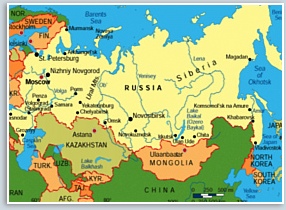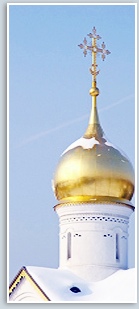RUSSIAN FEDERATION
![]()

The nation's history began with that of the East Slavs. The Slavs tribes emerged in Europe between the 3rd and 8th centuries AD. The first East Slavic state, Kievan Rus', arose in the 9th century and adopted Christianity from the Byzantine in 988, beginning the synthesis of Byzantine and Slavic cultures that defined Russian culture for the next millennium. Kievan Rus' ultimately disintegrated and the lands were divided into many small feudal Russian states. The most powerful successor state to Kievan Rus' was Moscow.
In the early 17th century, a new Romanov Dynasty continued this policy of expansion across Siberia to the Pacific. Under Peter I (ruled 1682-1725), hegemony was extended to the Baltic Sea. Repeated devastating defeats of the Russian army in World War I led to widespread rioting in the major cities of the Russia and to the overthrow in 1917 of the imperial household. The Communists leaded by Lenin seized power soon after and formed the USSR. The brutal rule of Iosif Stalin strengthened Communist rule at a cost of tens of millions of lives. The Soviet Union sacrificed 26 million lives for victory in World War II.
The Russian Federation was founded following the collapse of the Soviet Union in 1991. It still possesses the world's largest stockpile of weapons of mass destruction.
Orthodox Christianity has been the major religion of Russia for centuries. While two-thirds of Russians consider themselves Orthodox Christians, opinion polls suggest that most of those identify with the faith out of nationalism. Islam, with about 15 million followers, is the second largest religion. As a consequence of state atheism 48.1% of Russian population are irreligious. Based on self-identification data, population of Russia includes 60% of Russian Orthodox Christians; 5% of Muslim; around 1% of Protestants (including 0.3% of Lutherans); somewhat less that 1% of Roman Catholics and Old Believers. Between 0.5% and 1% of population are adherents of Buddhism. Russian census of 2002 found 230 thousand (0.16%) ethnic Jews in the country, but only 8% of them (0.01% of total population) self-identify as followers of Judaism. It is believed that there are 3-15 million practicing Orthodox Christians and 1.5-4 million practicing Muslims in Russia; over 1.5 million Protestant (majority Baptists and Pentecostals); no more than 500 thousand Buddhists; 300 thousand followers of New religious movements; 60-200 thousand Roman Catholic; 50-80 thousand Old Believers. The majority of Russians are non-observant, and more than 50% never attend church services of any kind.

